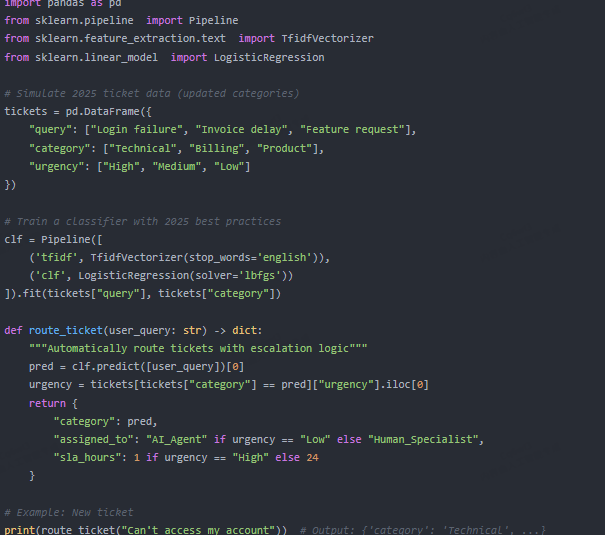Camila Fernández


Hello, everyone! I’m Camila Fernández, a dedicated professional deeply immersed in the transformative realm of intelligent automation and its strategic implications for knowledge and service work. With a passion for bridging technology and business, I’ve committed my career to exploring how intelligent automation reshapes industries, optimizes workflows, and unlocks new growth opportunities.
My journey in this field began with a strong academic foundation in computer science and business administration. As I delved deeper into emerging technologies, I was captivated by the potential of intelligent automation—from machine learning algorithms to robotic process automation (RPA). Recognizing its disruptive power, I focused on understanding how these tools impact knowledge - intensive and service - oriented sectors.
In the realm of knowledge work, I’ve witnessed firsthand how intelligent automation streamlines complex processes. For instance, in academic research, where sifting through vast amounts of literature used to consume countless hours, intelligent systems now analyze research papers, extract key insights, and even predict emerging trends. I’ve been involved in projects where we implemented AI - powered literature review tools for pharmaceutical research teams. These tools reduced the time spent on initial research by 70%, enabling scientists to focus on higher - value tasks like hypothesis formulation and experiment design.
In the service industry, the impact of intelligent automation is equally profound. Take customer service as an example. Through chatbots and virtual assistants, companies can now handle routine inquiries 24/7, improving response times by over 60% and enhancing customer satisfaction. I once collaborated with a telecommunications firm to integrate an intelligent customer service system. By analyzing customer data, the system not only answered frequently asked questions but also provided personalized product recommendations, increasing cross - sales by 35%.
owever, the rise of intelligent automation isn’t just about efficiency; it’s also about talent transformation. While it automates repetitive tasks, eliminating the need for many traditional roles, it simultaneously creates demand for new, high - skill positions. I’m passionate about advocating for upskilling and reskilling initiatives. For example, I’ve been involved in designing training programs that help employees transition from manual data - entry jobs to roles as AI trainers or data analysts. By 2030, as predicted by McKinsey, 15% of the global workforce will need to switch occupations due to automation, and I believe in equipping professionals with the right skills for this digital shift.
In conclusion, I see intelligent automation as a powerful enabler for the future of work. It offers unprecedented opportunities for innovation, efficiency, and value creation in knowledge and service sectors. As we navigate this transformative era, I’m excited to continue collaborating with like - minded professionals, driving positive change, and shaping a future where humans and machines work seamlessly together.
Thank you for taking the time to get to know me and my work. I look forward to exploring potential collaborations and contributing to the ongoing evolution of intelligent automation in knowledge and service work.


Artificial intelligence is undoubtedly the core key element of the intelligent automation system and can be regarded as the decision-making engine of the entire system. With the help of machine learning technology and a series of complex and sophisticated algorithms, enterprises can conduct in-depth and detailed analysis of massive amounts of structured and unstructured data. Through this process, enterprises can build a large and accurate knowledge base and make extremely accurate predictions based on the analyzed data. Taking the medical industry as an example, AI can quickly process and analyze massive amounts of medical record data, assist doctors in more accurately diagnosing diseases, and provide strong support for the formulation of personalized treatment plans.
In the financial field, AI achieves accurate risk assessment through in-depth mining of multi-dimensional data such as market data and customer transaction data, provides a scientific basis for investment decisions, and helps investors seize opportunities and avoid risks in complex and ever-changing financial markets.




In the field of customer service, the application scope of intelligent automation is extremely wide, and it has achieved remarkable results. Among them, chatbots are typical representatives of intelligent automation applications. Based on advanced natural language processing (NLP) technology, it can understand customers' consultation intentions in real time and accurately, and quickly provide accurate and clear responses. Whether customers are consulting about product information, wanting to know the functions, features, and usage of the product, or inquiring about the order status, paying attention to whether the order has been shipped, the estimated delivery time, etc.;
Whether it is the answers to common questions, such as after-sales service policies, return and exchange procedures, etc., chatbots can respond efficiently, greatly shortening the customer's waiting time and significantly improving the service response speed. At the same time, through intelligent automation technology, the system can intelligently allocate work orders to the most suitable customer service personnel based on multi-dimensional factors such as the type and urgency of customer problems, as well as the professional skills and current workload of customer service personnel. In this way, it ensures that every customer problem can be solved in a timely, professional and effective manner, thereby comprehensively improving the overall service quality and enhancing customer satisfaction and trust in the company.